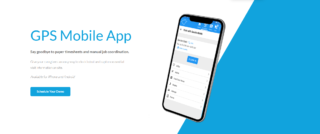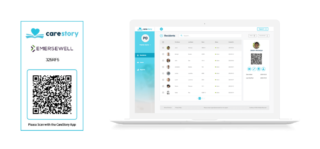Caring & Technology: A New Aspect of LTC Software

Darren retired three years ago and became the primary caregiver to his dad, who was diagnosed with Alzheimer’s disease. He cares for his dad in his home in Austin, Texas, and his two children also help out weekly. Darren is determined to help his dad find the best care possible. However, he is unsatisfied with the quality of care his dad receives. He spends a lot of his time repeatedly telling care staff his father’s care preferences and personal story. Still, it’s hard for care staff to remember all the detailed information he provides while also providing dedicated care.
“Is there any approach to bridge the gap between aging populations, their families, and caregivers so that we all know each other well and can be as supportive as possible?” Darren started looking for better care and better long-term care management technology.
Normal Care and Normal Technology in Long-term Care
An electronic medical record (EMR) is a digital version of all the information you need, such as residents’ information and the specific care, both medical care and daily activity assistance. An EMR system fosters effective communication and coordination among healthcare team members for optimal patient care. However, EMR systems also have their drawbacks —
Here’s a screenshot of an EMR system:

The EMR lists all the tasks that care staff have to perform, as well as who should provide what kind of care to which senior at what time of day.
When care staff access the resident’s documents through the EMR system, they only know residents’ names, demographic information and medical history. Care staff unconsciously influences themselves to view seniors as a bunch of tasks and to-do lists. As a result, there are many cases of medication mix-ups in long-term care homes.
Long-Term Care Culture Change Revolution
Many residents’ family members have uncovered this problem and have raised their concerns to long-term care homes. Apparently, the long-term care industry has identified the common satisfaction issues and is using dissatisfied feedback as the foundation for improvement. Therefore, a culture change in long-term care homes has taken place, moving from an overemphasis on medical issues and safety to a resident-directed, consumer-driven quality of life and health promotion.
Getting to know each resident well and staying in touch with their families closely has become a trend in the long-term care field, and the upsides of this culture change revolution are remarkable. Without focusing on the importance of the relationships between residents and long-term care staff, we cannot make this shift. Actually, culture change is an approach to continuously improving the quality of long- term care in the long run.
Why the Revolution in LTC Management Software is Inevitable
True true, the revolution in the long-term care industry is inevitable. However, so is the revolution in long-term care management systems. Seniors and families start to care more about the quality of the care and look for further and more profound connections between caregivers and seniors. Long-term care homes should make more of an effort in regard to relationship management. Indeed, it’s time to transfer from the EMR system to a more empathetic long-term care management system.
Seniors are more receptive to care from care staff they trust, those who know them better and those who can empathize and resonate. Care staff are more willing to provide quality care to residents they know better. Deep understanding and communication can build a warm relationship between residents and care professionals.
Care with Empathy
In conversations with caregivers in various long-term care homes and at the educational seminar on Alzheimer’s Disease and Dementia Care held by Dementia Care Education, one central idea was brought up several times — Care with Empathy.
In the previous paragraphs, we have discussed why we need to care with empathy and why care with empathy will be the trend in long-term care. Now it’s time to uncover how technology can help care staff and families achieve resident-directed, consumer-driven care for our beloved seniors.
Meeting Booking & Emergency Communication Call Systems
Keeping updated on seniors’ health information is always salient, so care staff and family members should have constant meetings, which therefore raises demands for virtual meetings and booking systems. A premium meeting function could help caregivers and families have more smooth virtual communication and connection, just like face-to-face communication. In addition, the booking system should also include an emergency communication call system, just in case.
For instance, AxisCare is a software that provides leading clients and caregiver communication functions. It allows caregivers to set phone calls with seniors’ family members and have a real-time chat with them.

Innovative Profile Systems
Normal EMR systems only provide basic data of the residents, but now we need more in-depth information on residents. An innovative profile system should provide resident profiles with fact pages, life stories and video messages, so care staff can understand residents better. This would enable them to deliver individualized holistic person-centred care for senior residents. Families could also use smart devices to engage with their residents through the use of smart devices.
The power of family stories and memoirs can be harnessed to increase caregiver empathy and help provide better care for elderly people, according to researchers at the University of British Columbia in Canada. In addition, personal stories can shape our brains and move us to be more empathic and generous, research has shown.
If you would like to try software that can create a life story for your loved one, MemoryWell is a good option to boost seniors, families, and care staff engagement and build more smooth communication through the life stories function!

Personalized Music Playlists
If you want to start caring empathetically, playing personalized music playlists during care is a great place to start. Playing music that seniors are interested in opens avenues of communication. If you want to know how music can calm the elderly, please check our previous music blog post.
Linked Senior is a software that provides music therapy and sing-alongs to engage residents based on their personal experiences.
Want to try another innovative long-term care management system? CareStory is a great choice! Check here to view how CareStory works! The CareStory app allows family members to share background information about the resident. Staff, caregivers, and nurses can share each residents’ unique care preferences. The platform is dynamic and easy to access with an almost zero learning curve. All stakeholders can contribute to residents’ profiles within their own privileges. Want to see the power of caring with empathy? It’s time to try a demo!
Reference:
https://greatergood.berkeley.edu/article/item/how_stories_change_brain



